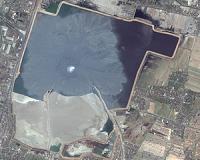| . |  |
. |
Guatemala City (AFP) May 28, 2010 Thousands of people were evacuated and airports were closed as two volcanos erupted in Guatemala and Ecuador Friday, choking major cities with ash, and leaving two dead, officials said. Guatemalan President Alvaro Colom declared a 15-day state of emergency around the Pacaya volcano, 50 kilometers (31 miles) south of the capital. The volcano erupted again Friday after first bursting back to life Wednesday, killing two people, including a television reporter covering the event. In Ecuador, the Tungurahua volcano exploded into action Friday, forcing the evacuation of at least seven villages and closing down the airport and public schools in Guayaquil, the country's largest and most populated city. As the 2,552 meters (8,372 feet) Pacaya volcano exploded anew on Friday, with billowing clouds of ash and dust, Colom said La Aurora International Airport, in Guatemala City, would remain closed until Saturday "because we've got to clean the runways and surrounding areas" of ash. The airport closures were reminiscent of the massive blanket of ash Iceland's Eyjafjoell volcano spewed out last month causing the biggest aerial shutdown in Europe since World War II, affecting more than 100,000 flights and eight million passengers. President Colom said the eruptions of Pacaya since Wednesday had killed two people, injured 59, left three children missing and destroyed 100 homes. The Emergency Management Coordinator said between 1,700-1,900 people have been evacuated from their homes to nearby shelters in three departments affected by the emergency decree. The Education Ministry also suspended classes in the emergency area. On Friday, the volcano was rocked by constant explosions and spewed bright-colored plumes into the air. Guatemala City was covered in a blanket of ash and dust, as people evacuated from the danger zone wandered the streets darkened by the ash cloud and the city's two million inhabitants tried to cope with the catastrophe. The head of the national seismological institute warned more eruptions could take place "in the coming days" at the most active volcano in Central America. The Pacaya volcano has been active for 49 years and has experienced six large eruptions. The head of the national seismological institute Eddy Sanchez said the volcano had accumulated a lot of energy over several years. "Like a pressure cooker, it will release the pressure violently," he told reporters. He warned that lava would continue to spew out at high altitudes. The charred body of television journalist Anibal Archila was found near the volcano by a colleague, who said the victim could not escape the raining rocks and other projectiles thrown out when the volcano exploded late Thursday. "We decided to stay a few minutes longer taking more photographs. Suddenly, we heard rumblings and rocks began falling all around so we had to get out running," a driver for one of the reporters covering the scene with Archila told the Nuestro Diario newspaper. The second eruption-related fatality was that of a 22-year-old man who fell to his death as he cleaned volcano ash from the roof of a school. Colom vowed government action to clean up the gray mess. "The people must feel confident that the state is responding," the president said as he announced he would travel to the most affected municipalities to work with emergency committees. Within a 100-kilometer (62-mile) radius of the volcano, locals armed with brooms and shovels scrambled to remove sand and ash from the roofs and courtyards of their homes. "We've only cleaned the backyard so far and we've already filled a large garbage bag," Isabel Estevez told AFP. She and her husband began cleaning the sediment dumped by the volcano, up to five centimeters (two inches) thick in some places. In Ecuador, meanwhile, the Tungurahua volcano experienced one of its biggest eruptions Friday, spewing columns of ash and rock prompting evacuations of at least seven surrounding villages. "Certain measures have been taken, including the closure of Guayaquil airport until further notice and the suspension of classes in Guayas province, as we make a new assessment" of the situation, said Yuri De Janon, regional coordinator of risk management. He said the ash fallout from the volcano was affecting Guayaquil and four other towns in Guayas. Hugo Yepes, director of Ecuador's Geophysical Institute, noted that the volcano was at one point spewing molten rocks and large clouds of ash and gas 10 kilometers (33,000 feet) into the sky. But he said the volcanic activity had since decreased.
Share This Article With Planet Earth
Related Links Bringing Order To A World Of Disasters When the Earth Quakes A world of storm and tempest
 Indonesia mud volcano still spewing sludge four years later
Indonesia mud volcano still spewing sludge four years laterPorong, Indonesia (AFP) May 29, 2010 Four years after it erupted from the well of a gas company linked to one of Indonesia's richest men, the mud volcano known as "Lusi" is still spewing its toxic sludge over Java's countryside. All attempts to plug the geyser have failed and new spouts are opening up, threatening to destroy more villages, homes and livelihoods in the East Java district of Sidoarjo. The mud lake is so huge ... read more |
|
| The content herein, unless otherwise known to be public domain, are Copyright 1995-2010 - SpaceDaily. AFP and UPI Wire Stories are copyright Agence France-Presse and United Press International. ESA Portal Reports are copyright European Space Agency. All NASA sourced material is public domain. Additional copyrights may apply in whole or part to other bona fide parties. Advertising does not imply endorsement,agreement or approval of any opinions, statements or information provided by SpaceDaily on any Web page published or hosted by SpaceDaily. Privacy Statement |